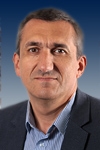There is no national or local research about how much the life rhythm of students is turned upside down during the exam period, but there is international research available. These all show that this is a hard, strained and highly stressful period for students, they go to sleep and wake up at differing times, have different meals at different times than usual, consume more coffee, do less sports and neglect social relationships. Many of them are sure that what they cannot finish during the day can be dine at night, so they keep studying during the night. However, studies highlight that those students who pull all-nighters will not be more successful in their exams.
The physical and mental wellbeing of students is important in the Well-Being Concept of the University of Pécs Medical School, therefore I interviewed dr. Béla Faludi, associate professor of the University of Pécs Department of Neurology, head of the Sleep Medicine department, and dr. Andrea Horváth-Sarródi, assistant professor of the University of Pécs Medical School, Department of Public Health Medicine, coordinator of the YourLife program and the Well-Being Concept’s physical health workgroup. The two experts shared some advice for the coming weeks.
written by Rita Schweier
 “We can draw a parallel between the exam period and the Covid pandemic, since they basically have the same chain of events. The students are at home to study in isolation and barely have any interpersonal contact, and also fall out of their usual daily routine. Most problems are caused by this. Studies done during the pandemic showed, that the sleep cycles of people shifted by about thirty minutes to an hour, meaning that they went to bed this much later. This has caused them to wake up at a later date in the morning, restructuring their entire day. Since interpersonal contact is missing in such periods, they can only be replaced by the phone. However, constant messages are a distraction, and cause a break from studying; the planned schedule is also disturbed. All of this is topped up by stress, the frustration of approaching exams that is compounded by the number of subjects the exams are in. Preparation for these cannot be done solely in the exam period; those who do not study during the instruction period will have an even harder time” – said dr. Béla Faludi.
“We can draw a parallel between the exam period and the Covid pandemic, since they basically have the same chain of events. The students are at home to study in isolation and barely have any interpersonal contact, and also fall out of their usual daily routine. Most problems are caused by this. Studies done during the pandemic showed, that the sleep cycles of people shifted by about thirty minutes to an hour, meaning that they went to bed this much later. This has caused them to wake up at a later date in the morning, restructuring their entire day. Since interpersonal contact is missing in such periods, they can only be replaced by the phone. However, constant messages are a distraction, and cause a break from studying; the planned schedule is also disturbed. All of this is topped up by stress, the frustration of approaching exams that is compounded by the number of subjects the exams are in. Preparation for these cannot be done solely in the exam period; those who do not study during the instruction period will have an even harder time” – said dr. Béla Faludi.
The head of the Sleep Medicine Department has emphasized: in order to commit everything we learn to memory, various sleep stages, sufficient sleep framework and sleep time are needed.
We are not required to gut ourselves
According to dr. Andrea Horváth-Sarródi, students not having enough rest is a real problem at the Pécs Medical School, and it regularly comes up during health development courses, workshops and one-on-one consultations as well. As she says, students are telling each other that gutting themselves during the exam period is a “must”, and those who do not study from the break of day until the end of day are not good students. They find it surreal if a student leaves their studies in the afternoon to go for a walk or go play football with their friends, watch an episode of their favourite TV series and then go to bed at a reasonable time. If a students comes from a family where self-flagellation is a pattern and success can only be achieved through suffering, their frustrations will be even stronger.
“The 24 hour opening time of the university sends an incorrect message, and I believe this is a harmful student service. Staying up to study for such long hours at night can cause the development of the so-called delayed sleep phase syndrome. If a student spends 2-3 hours a night bent over a book, then they can only get up at around 9-10 in the morning, and this pattern will become fixed, since the exam period lasts for a month and a half. Studies show that a single all-nighter can be compensated with one or two longer sleeps. However, after two nights of little to no sleep, five nights of goof rest is needed until mental performance is normalised again. Those who already have sleep disturbances have it even harder since their lack of sleep will make matters worse” – emphasized dr. Béla Faludi.
Sleep apnoea affects young people too
As he said, sleep apnoea affects 5% of the population, and some of the affected are young. Restless leg syndrome affects 10% of the population in Europe.
 “Those students with a background in sports have a healthier attitude to sleep and nutrition. They know that these are the pillars of high performance. Attendance at the university can be considered serious mental work. The eight-hour workday was invented for a reason, after which it is important to relax and regenerate. Young people should look at their university activities the same way. The extra performance during the exam period can only be done with methods other than the usual, and their implementation requires self-awareness. There are students who need nine hours of sleep for proper concentration, others can function with less” – said dr. Andrea Horváth-Sarródi.
“Those students with a background in sports have a healthier attitude to sleep and nutrition. They know that these are the pillars of high performance. Attendance at the university can be considered serious mental work. The eight-hour workday was invented for a reason, after which it is important to relax and regenerate. Young people should look at their university activities the same way. The extra performance during the exam period can only be done with methods other than the usual, and their implementation requires self-awareness. There are students who need nine hours of sleep for proper concentration, others can function with less” – said dr. Andrea Horváth-Sarródi.
Dr. Béla Faludi added, that while students come to the university during the exam period, go outside, are exposed to natural light and meet their peers, during the exam period they have a so-called “narrowed circadian amplitude”. If the amount of physical and mental load increases, it affects the structure and quality of sleep.
Mental processes are damaged first
“Sleep is an important period for physical and mental regeneration and energy recharging processes, and it cannot be substituted. Any sleep disorder affects and damages cognitive processes and mental workings connected to the frontal lobe of the brain first. Heart and circulatory or cerebrovascular diseases take years or decades of sleep disorders, but the door to them can opened young” – said dr. Béla Falusi, who does not like numbers connected to how much sleep we should be getting. He highlighted that the amount of sleep required cannot be generalised, because it varies from person to person: everyone needs to sleep as much as they need to function properly the next day both mentally and physically.
Coffee before a 30 minute nap: the power napping method
According to dr. Béla Falusi, there is a method we can use if we want to stay up late to study: power napping. It works by taking a 30 minute nap in the afternoon, but drinking a coffee immediately before the nap. This way, we will wake up much more aware than after a normal nap. It is important that the nap does not last longer than 20-30 minutes, because if it does, we will wake up tired.
“In the health development course, students can choose: they can either prepare a presentation about theory, or bring a challenge that can be connected to sleep. A while ago, a students talked about how they made changes in their life in connection with sleep, since before they could only sleep for 4-5 hours, and woke up multiple times each night. After about 6-7 weeks, they got to the point where they sleep 7,5-8 hours each day, and only wake up once. These are the changes the student made that can also be considered sleep hygiene tips: the 4-5 coffees a day were reduced to 2, and the second is consumed latest around 4pm. The student also walks everywhere, and runs at least 20 minutes a day or does some kind of cardio, and plays football with friends on the weekends. The student has dinner around 6:30pm and does not eat after that, and takes care of what they eat during the day. After all this, they go to bed around 11pm each day, making sure that their room is fully dark” – explained dr. Andrea Horváth-Sarródi.
We need to leave time to fall asleep
Dr. Béla Faludi explained that we need time to fall asleep. We cannot expect to fall asleep immediately when we hit the bed in our darkened room after spending a day in front of bright blue lights – lamps or screens. We need a gradual switch. Therefore he suggests that we spend an hour or more reading with diminished light before we sleep.
Photo:
Pixabay
